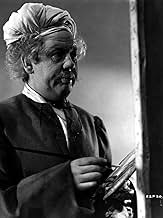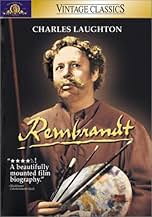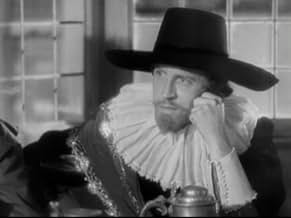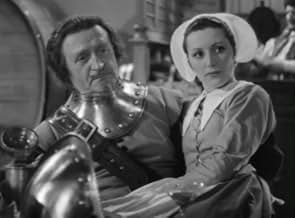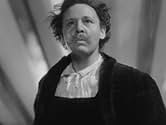Película biográfica sobre el célebre pintor holandés. En 1642, habiendo alcanzado la cima de la fama, muere repentinamente su adorada esposa. Desde entonces su pintura es más oscura, pesimis... Leer todoPelícula biográfica sobre el célebre pintor holandés. En 1642, habiendo alcanzado la cima de la fama, muere repentinamente su adorada esposa. Desde entonces su pintura es más oscura, pesimista y dramática, lo que disgusta a sus mecenas.Película biográfica sobre el célebre pintor holandés. En 1642, habiendo alcanzado la cima de la fama, muere repentinamente su adorada esposa. Desde entonces su pintura es más oscura, pesimista y dramática, lo que disgusta a sus mecenas.
- Premios
- 1 premio en total
Argumento
¿Sabías que...?
- CuriosidadesSam Livesey, the father of three other actors in this movie--Roger Livesey, Barry Livesey, and Jack Livesey--died the day after this film was released in London.
- PifiasWhen Rembrandt reveals the newly completed painting, 'The Night Watch', we see not the full, original version that he in fact painted, but the drastically butchered version that was made over 40 years after his death, when the painting was moved from its original exhibition space in the Kloveniersdoelen to a less capacious display space in the Amsterdam Town Hall in 1715.
- Citas
Rembrandt van Rijn: And of a sudden he knew that when one woman gives herself to you, you possess all women. Women of every age and race and kind, and more than that, the moon, the stars, all miracles and legends are yours. Brown-skinned girls who inflame your senses with their play, cool yellow-haired women who entice and escape you, gentle ones who serve you, slender ones who torment you, the mothers who bore and suckled you; all women whom God created out of the teeming fullness of the earth, are yours in the love of one woman.
- Créditos adicionalesOpening credits prologue: In the seventeenth century Holland was a world power, her ships carried treasure to Amsterdam from all parts of the earth. But her proudest glory was the son of a miller from Leyden, Rembrandt Van Rijn, the greatest painter that has ever lived. He died in obscurity, his belongings no more than a few shillings.
Today no millionaire is worth the money the works of Rembrandt would realise, if ever offered for sale.
- ConexionesFeatured in Dumb Dora Discovers Tobacco (1945)
Sir Alexander Korda's production of the life of the celebrated artist is beautifully presented on screen. Chief among its assets - and the main reason for its success - is the magnificent performance by Charles Laughton. Eccentric & temperamental, Laughton could be difficult to work with. But once fascinated by a role he gave it the full vibrato of his own extensive genius - here he makes Rembrandt an equal member of his continuing roster of fascinating portraits from the decade: Henry VIII, Bligh, Quasimodo.
Laughton had the remarkable ability - like the English actor George Arliss, working in the American cinema - of using his physical ugliness to great advantage, his eyes in particular offering glimpses of his characters' souls. At various points throughout the film - a monologue of Woman's Mysteries; reading from The Scriptures - Laughton's beautiful, soothing voice reaches beyond the screen and down the years to caress the listener.
Making a rare screen appearance, stage legend Gertrude Lawrence plays Rembrandt's shrewish housekeeper & companion, Geertje Dirx. Laughton's wife, the luminous Elsa Lanchester, is unforgettable as Hendrickje Stoffels, the housemaid who wins her employer's love and becomes his greatest defender and champion.
The wonderful actor Roger Livesey, almost unrecognizable behind a bushy beard (but there's no disguising that unique voice) is memorable as the ragged beggar Rembrandt hires to model the Old Testament despot Saul; Livesey's scenes with Laughton are among the best in the entire film. John Bryning turns in a sensitive portrait as Rembrandt's son Titus. Sir John Clements has the small role as Govert Flinck (1615-1660), Rembrandt's disaffected apprentice and eventual rival. Movie mavens will recognize an uncredited Wilfred Hyde-White in a tiny cameo as an officer of the Amsterdam Civic Guard.
The film is given first rate production values, with marvelous interior sets & costumes. The exterior Amsterdam sets are visually striking, with the camera angles and the stark angularity of the buildings making them look almost expressionistic. These contrast nicely with the simplicity with which the brief outdoor rural scenes are depicted.
**********************************
Some important dates in the life of Rembrandt:
15 July 1606 - born in Leiden, The Netherlands, to the local miller.
1620-21 - attends University of Leiden.
1631 - moves to Amsterdam.
1634 - marries wealthy Saskia van Uylenburgh.
1639 - purchases large Amsterdam house.
1641 - son Titus is born.
1642 - Saskia dies; Rembrandt paints 'The Shooting Company of Captain Franc Banning Cocq ('The Night Watch').'
1649 - hires Hendrickje Stoffels as housekeeper; she becomes his common-law wife.
1654 - Hendrickje, pregnant with daughter, is censured by church council for living in sin.
1656 - Rembrandt declared insolvent; house & goods auctioned to pay debts.
1663 - death of Hendrickje.
1668 - death of son Titus, aged 26.
4 October 1669 - dies in Amsterdam.
Rembrandt produced approximately 300 etchings, 600 paintings and 1,400 drawings.
- Ron Oliver
- 13 jun 2003
- Enlace permanente
Selecciones populares
- How long is Rembrandt?Con tecnología de Alexa
Detalles
- Fecha de lanzamiento
- País de origen
- Idioma
- Títulos en diferentes países
- Büyük Ateş-Rembrandt
- Localizaciones del rodaje
- Denham Studios, Denham, Buckinghamshire, Inglaterra, Reino Unido(Studio, uncredited)
- Empresa productora
- Ver más compañías en los créditos en IMDbPro
- Duración1 hora 25 minutos
- Color
- Relación de aspecto
- 1.37 : 1
Contribuir a esta página



